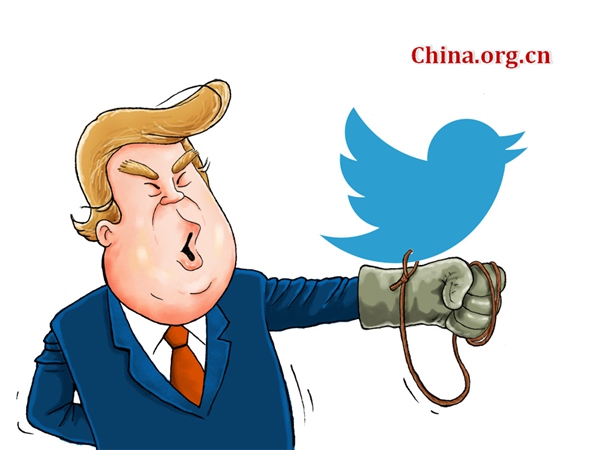Redlines: cybersecurity, Trump and Sino-US relations
- By Kyle Calandra
 0 Comment(s)
0 Comment(s) Print
Print E-mail China.org.cn, February 24, 2017
E-mail China.org.cn, February 24, 2017
|
|
|
Trump card [By Zhai Haijun / China.org.cn] |
A few weeks before the 2016 American Presidential election, an article written by Adam Segal appeared on the Observer Research Foundation's website highlighting the U.S.-China Cyber Agreement. A year after the landmark agreement, the article detailed the unlikely development of what became the two countries' surprising negotiation.
Segal, the director of the Digital Cyberspace Policy Program at the Council of Foreign Relations, revealed in the months leading up to the meeting that "Washington and Beijing had recently clashed over… the global governance of cyberspace and, most conspicuously, cyber attacks and espionage," admitting, "there was little reason to think that the United States and China would be able to narrow the gap in cyberspace."
President Obama announced the agreement in September 2015, saying "neither the U.S. nor the Chinese government will conduct or knowingly support cyber-enabled theft of intellectual property, including trade secrets or other confidential business information for commercial advantage."
Perhaps more importantly, the deal created a platform for common ground concerning the contentious issue, prompting both China and the U.S. to "identify and endorse norms of behavior in cyberspace; and establish two high-level working groups and a hotline between the two sides."
A dramatic shift in the tone of the ongoing arguments surrounding cybersecurity, critics of the U.S.-China consensus remained sceptical.
Obama, reflecting on the still tenuous nature of the issue, asserted, "The question now is, are words followed by actions? And we will be watching carefully to make an assessment as to whether progress has been made in this area."
In addition to scepticism, there were also legitimate concerns that it might not be enough to sufficiently reconcile the deep divide that exists between the two countries in cyberspace. According to Segal, "Framed against the broad landscape of cyber issues, the agreement on cyber espionage looks less consequential even if it was a significant diplomatic achievement. But the U.S. and China continue to hold fundamentally incompatible conceptions of how cyberspace should be ordered."
In an article for The Diplomat, Gary Brown and Christopher D. Yung detail China's fundamental perspective, writing, "Beijing emphasizes the importance of cyber sovereignty. At the World Internet Conference in December 2015, President Xi Jinping called for states to be allowed to set their own rules for cyberspace in their own countries," whereas the two authors believe that the Unites States fundamentally values the "free flow of information over the internet" seeing it as "the key to strategic and diplomatic success."
Speaking at the World Internet Conference, President Xi emphasized the importance of an international convention against terrorism in cyberspace in which countries might further signal intent and further their commitment to countering the rising threat of cyberterrorism.
Moving forward, the hope of continued cooperation and communication remains justifiable, but it is likely to be undercut by the uncertain future of Sino-U.S. relations heightened by the often antagonistic and unpredictable nature of the new administration in Washington.
At this point, Trump's position on cybersecurity is anyone's guess. And so too is the immediate future of Sino-U.S. relations. With Trump and company apparently mute on the subject, Xi Jinping stepped into the spotlight on Friday, perhaps reassuring China's commitment to the issue in light of U.S. silence.
According to Xinhua, President Xi, who heads China's National Security Commission, called for an overall national security outlook, "emphasizing the importance of political, economic, territorial, social and cyber security." Xi stressed that "safeguarding national security requires the grasp of rules in the context of the great changes in the international order," saying, "No matter how the international situation changes, we must maintain our strategic steadiness, strategic confidence and strategic patience."
At the time, Adam Segal wrote that the 2015 U.S.-China Cybersecurity Agreement was seen as an "important first step for China and the U.S." With the uncertainty of Trump's foreign policy and the current lack of confidence in Trump's cybersecurity platform, Sino-U.S. relations might need to rely on the Cybersecurity Agreement as the bedrock of cyberspace relations moving forward.
With so much at stake, it would be regrettable if the agreement existed as the high water mark of cyberspace cooperation. It's imperative that both countries see it as a point of origin, or at the very least, as Segal writes, as a platform for achieving "a greater understanding of each other's redlines so that a conflict in cyberspace does not spill into the real world."
Having previously lived in Beijing working as a journalist and editor, Kyle Calandra is currently based in America reporting on Sino-U.S. Relations as a contributor for China.org.cn.
Opinion articles reflect the views of their authors only, not necessarily those of China.org.cn.







Go to Forum >>0 Comment(s)